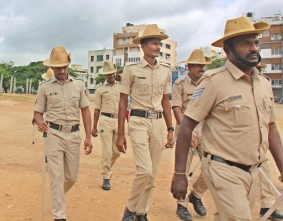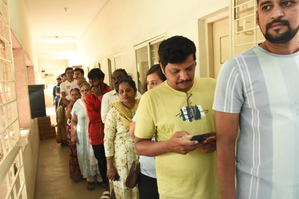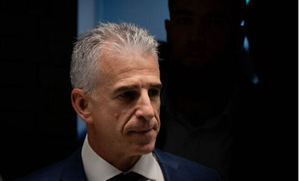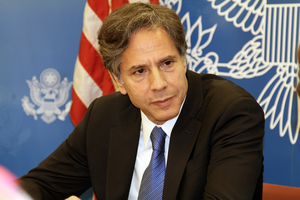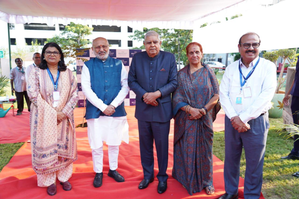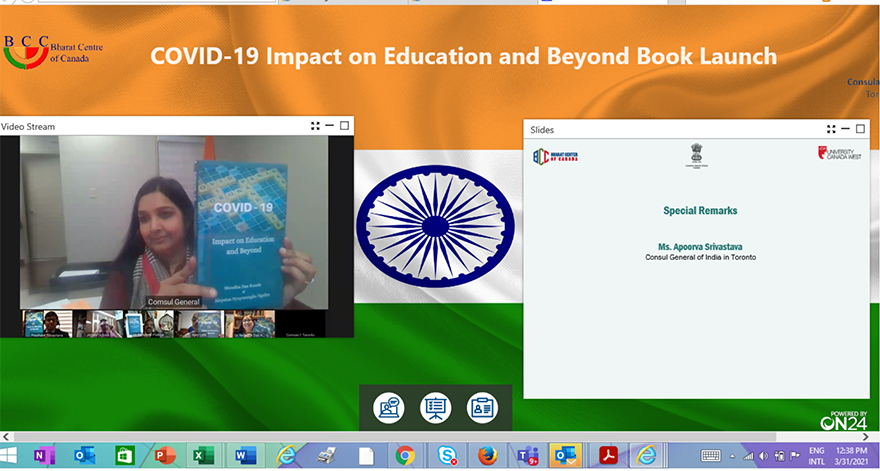Online book launch and discussion offers insight into the effect of pandemic on world eduction
An official event was organized last week to launch the book titled “COVID-19 Impact on Education and Beyond” which looks at the current pandemic situation worldwide.
The online book launch and discussion that followed were organized jointly in Association with the Consulate General of India (CGI) in Toronto, a policy think tank the Bharat Centre of Canada and University Canada West of British Columbia.

Mr. Brock Dykeman, President-Vice Chancellor University Canada West launched the Book and congratulated the editors and authors of the book. Mr. Brock, in his key remarks, briefly described the pandemic’s challenges and how University Canada West acted to tackle the difficulties associated with the Covid-19 pandemic and the teaching and learning process.
Mr. Dykeman explained how the World Health Organization declared precisely a year ago the pandemic on March 11th, 2020 – and since that time, people are suffering from this epidemic. Also, Mr. Dykeman mentioned international students faced a lot more challenges as they had to continue with the online classes from their home country.
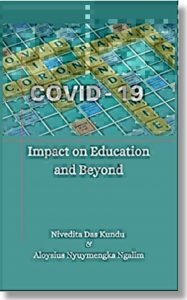
For new international students, it was impossible to join a university in person because visa offices were closed in different countries, which also became difficult for such students to travel during the pandemic time.
Mr. Dykeman appreciated the book editors and authors’ timely initiative to look at the the Covid-19 pandemic and its implications on education. He said teaching and learning had to switch to online education, changing the instruction modes and the learning management system.
Mr. Dykeman also expressed concern about thesignificant policy impact, mainly about government organizations’ considerable cost with the economic shut-down and the economic subsidies given to all sorts of industries, institutes, etc. He also shared his concern on the Covid-19 pandemic impact because of its long-lasting effects on various sectors and fields of human endeavour.
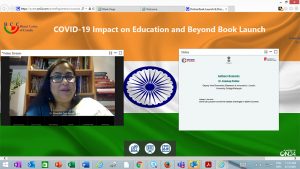
Dr. Nivedita Das Kundu, President-Bharat Centre of Canada (BCC), Faculty, York University, editor and a chapter author of the book. briefly introduced the book, “which is on a critical topic of present-day relevance and deals with teaching and learning methods used by the educational institutions during the lockdown.”
Dr. Kundu explained that the book chapters were based on practical experiences, assessment of the situation by prominent academics, practitioners and university teachers from different countries. Dr. Kundu mentioned that education was not only a fundamental human right, but it was also a key to sustainable development and progress.
“When the education system breaks down, growth and peace cannot be sustained in any society,” she pointed out. She mentioned that the book is divided into three sections: the first section gives a broad overview of the “teaching and learning experiences during the pandemic,” the second section presents “societal effect and schooling during the pandemic,” and the third section attempts to analyze “e-learning and community concerns during a pandemic.”
The book also depicts the impact on the social and economic sectors along with the education sector. The chapters include case studies from different countries in Africa, Asia, Europe and North America, depicting how different nations responded to the pandemic surprises.
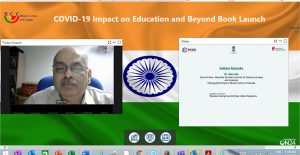
Dr. Ajey Lele, Distinguished Expert, Bharat Centre of Canada, Senior Fellow, Manohar Parrikar Institute for Defence Studies and Analyses and another chapter author, explained the book’s uniqueness in its outlining of the impact of Covid-19 on the education system. Dr. Lele briefed about the sections of the book, where the first section gives a whole thematic idea about pandemic problems and how in the education sector, everyone is trying to overcome the difficulties posed by pandemic situation and restrictions. The second section of the book looks into the issue from a societal point of view and how educational institutions looked into all those aspects and tackled this problematic situation. The third section deals with case-specific studies from different countries.
Dr. Lele discussed his contribution to the book, about education in India and how India efficiently handled the pandemic situation. Dr. Lele closed his observations stating that though the teachers and students’ community had ensured that the spread of disease would not impact their education. He also said that on a positive note, it is a given fact that offline education wlould start again post Covid-19 period as soon as, things get back to the normal.

Dr. Sandeep Poddar, Deputy-Vice Chancellor(Research and Innovation), Lincoln University College, Malaysia. Dr. Poddar expressed concern that it had already been one year with Covid-19, but, the cases were still increasing rapidly;
Dr. Poddar explained how the United Nations Sustainable Development Goal (UNSDG) for quality education was the central pillar of the society as it supports all the 17 SDGs of the United Nations. Dr. Poddar emphasized that many countries in Southeast Asia, including Indonesia and Malaysia, faced similar technical challenges. He discussed the practical aspects of teaching that cannot be imparted through online education, such as laboratory experiments etc. Also, he showed concern about mental health issues among students and faculty. Dr. Poddar stressed that as social media usage had increased during the pandemic time,was also causing a side-effect in the form of depression among youngsters. Dr. Poddar also gave the example of Darwin’s theory of the struggle for existence comparing with the present situation.

Dr. Jayanta Das, Faculty, Bharat Centre of Canada, Peripheral Vascular Surgeon, AMRI Hospital discussed two aspects of the book – one the impact of Covid-19 on the educational system, and another is the impact in various societies as it has affected everybody in every corner of the world. Dr. Das mentioned that India has suppliedvaccines to more than eighty-four countries to date, including to the UK, Canada and Argentina, to name a few. According to Dr. Das, Covid-19 has fundamentally changed everyone in every field, including educational patterns. He emphasized that almost all governments were struggling, and the scholarly world and academic institutions were not exceptions.
Dr. Das pointed out the the idea of education as explained by Swami Vivekananda who said: “Education is the manifestation of the perfection in man,” So although knowledge can be imparted through online education systems, the parameters for physical activity and social activity cannot be fulfilled. Dr.Das ended on a note that at this juncture there is no other avenue which is sustainable to impart knowledge to the students – so everyone involved has to adjust with online teaching and learning methods.
Ms. Apoorva Srivastava, Consul-General of India in Toronto congratulated the authors and editors. She said the Covid-19 pandemic had brought massive changes in every field, including education. Ms. Srivastava explained that the entire global education system in the physical sense had ground to a standstill due to thepandemic; However, online studies had emerged as an alternative to in-person learning because of the digital platforms.
Ms. Srivastava expressed her concern as children faced specific problems during online lessons and distance learning, such as rising mental health issues because of a lack of the social connection. Ms. Srivastava acknowledged that the book was very timely and would help understand the pandemic’s impact on education and beyond. She also applauded India’s effort to launch the world’s largest vaccination drive.
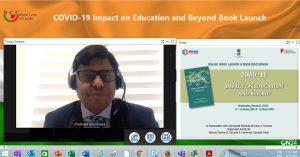
Under India’s philosophy of “Vasudeva Kutumbakam,” which means the “world is one family” and “Survey Bhavantu Sukhinam Sarve Bhavantu Niramaya,” i.e. “everybody should be happy and healthy.” She added that India could serve the world population by sending vaccines to countries in their need. Ms. Srivastava emphasized that India had also become the second-largest producer of PPE (Personal Protective Equipment) Kits in the world. Ms. Srivastava also recognized that the India-Canada education partnership had many note-worthy accomplishments, with over 230,000 Indian students present in Canada. She added that India was the largest source for incoming international students to Canadian universities and colleges. Ms. Srivastava ended her special remarks congratulating Bharat Centre of Canada and University Canada West for taking up this initiative.
The Book Launch/Book discussion programme moderator Mr. Prashant Srivastava, in his closing remarks, appreciated all the students and participants from different parts of the world for being a part of the unique event. He concluded the event on a positive note with the hope to continue with such educational and policy-oriented activities and programme jointly with BCC-UCW in association with CGI-Toronto.







